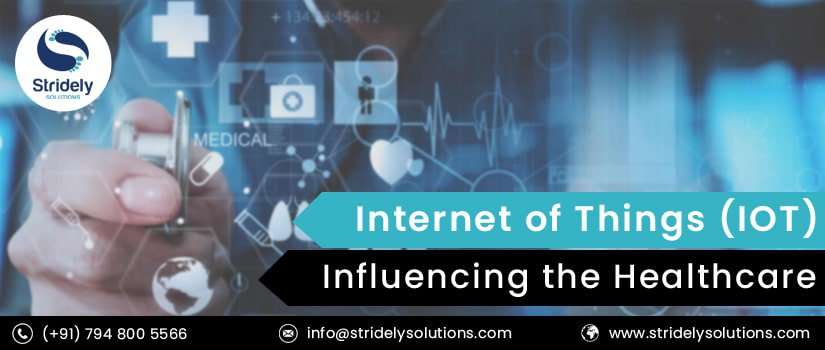We all are aware that technology cannot replace humans and the ultimate decision making would lie in the hands of the human. However, in the meantime, the individual can opt for certain technological solutions that would help in simplifying the work done by humans and at the same time also bring about efficiency in the work.
Internet of Things (IOT) is now becoming a common phrase on every individual’s lips. Interestingly IOT has been reaching out every degree of each field, whether it is education, finance, healthcare, gaming and many more such field. This term has been gaining a lot of acceptance since its commencement into this world of Information Technology. IOT can be described in three words and those are, Automation, Convenient, Efficient. IOT has become a game changer in the field of technology wherein it has created a buzz in almost all of the fields where it has been used. But the question arises as to how IOT would be useful in the Healthcare industry. How is IOT going to influence the field of healthcare?
What is the role of IOT in the healthcare field?
Firstly, IOT is an incomparable innovation and it has its own list of positives and negatives. The main goal of IOT in the field of healthcare is to connect doctors to their patients with the help of smart devices and without any kind of restrictions. Technology which is able to connect any of the devices just with an on and off switch via the internet and at the same time is also helpful in capturing and monitoring the data captured on another device is sure to be having some impact in this field.
When IOT was just introduced in the healthcare sector, there was use of remote monitoring, integration of various medical devices and the use of smart sensors. Also there were devices for tracking down the activity, monitoring the levels of glucose, smart beds, wearable biometric sensors and so on. So today, it feels impossible to imagine a future of healthcare sector without IOT.
There are two crucial purposes served by IOT in the healthcare sector:
- Leading to an improvement in the management of disease for providing a better experience to the patient.
- Bringing down the costs of healthcare so that the treatments become affordable by a wider group of people.
How IOT is influencing Healthcare sector?
When we talk about IOT, we are basically talking about a technology that is able to optimise each and every aspect of care and then getting it transformed the way it is supposed to be managed across the scale.
-
Reporting and Monitoring simultaneously:
Today there is real-time monitoring happening of the patient. This monitoring is connected to a device that would help in saving lives in case of any medical emergency such as asthma attack, stroke, heart attack or diabetes. When we talk about real-time monitoring it means that there is a smart medical device which is also connected to a smartphone application. This device that is connected would be timely collecting any medical related data. This data that has been transferred to the smartphone app would then directly be collected by the respected healthcare physician. So this way it would provide the doctor information beforehand if the individual is having any serious troubles. IOT device would be collection information related to oxygen levels, blood pressure weight, sugar levels and so on. All of these data are stored in the cloud and then it could be transferred to the doctor or the insurance company or any other individual you would want to share the information.
-
Keeping a track and getting alerts:
In case of any life-threatening condition, there is a need for on-time alert. IOT would be allowing the device to collect all of the important information and then transfer it to the respected person for a real-time tracking. The device can also give reports and timely alerts about the condition of the patient at any place and any time. This would help in making correct decisions and also provide timely treatment to the individual before any serious condition. Thus you can say IOT enables for real-time tracking and alerting of the condition of the patient for better and timely treatment. This would lead to a complete care of the patient.
-
Maintaining medical equipment’s:
We all are aware that medical equipments are very much costly and also hard to get replaced in case of breakdown. It would also become difficult to predict when the medical device has any malfunction leading to last minute rush or costing the life of an individual in case of emergency. With the help of IOT, there is an embedded system technology as well as sensors which would help in predicting when the equipment is nearing its breakdown stage. It also helps in analyzing the past behavior of the medical equipment along with its recent performance thereby predicting the downtime in advance.
-
Enabling better connectivity:
IOT is basically automating the healthcare of the patient. Making the process of treatment smoother for the patient. This can be done with better healthcare solutions in collaboration with new form of technologies. IOT enables communication between two machines, data movement, and thorough exchange of information. Thereby making the healthcare delivery service a smooth and effective one. There are various connectivity protocols that play a role, Wi-Fi, Bluetooth as well as the other modern age protocols. All of these would help in changing the way a disease is diagnosed in the patient and also bring about revolutionary changes in the process of treatment. It leads to cutting down on the costs of visiting the clinic or hospitals and better utilisation of the quality resources.
IOT has introduced various devices for making the lives of the patient much comfortable. Few of those devices include, hearing aids which are also compatible with Bluetooth and syncs to the smartphone, sensors that monitor the amount of medicine in the body and gives the necessary warning. There are also mood enhancing devices that improve the mood through the day. In all we can say that IOT has a major influence on the healthcare sector by delivering a number of facilities. If used in the right way, the technology can surely lead to an improvement in the product and also better care for the patient.


